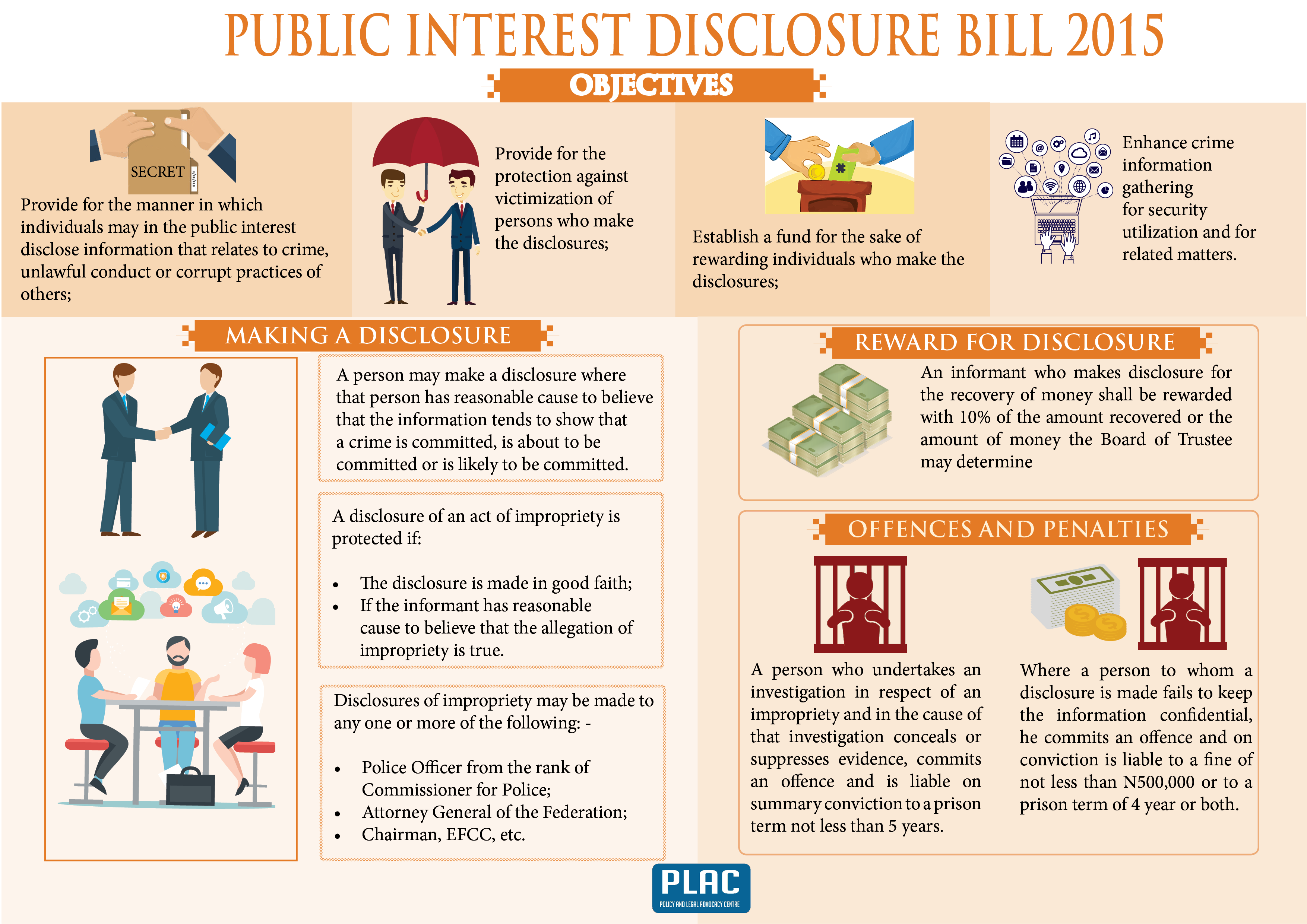HB 03: Public Interest Disclosure Bill, 2015
Download Bill Bill Analysis Download Bill Analysis Infograph
Sponsor:
Hon. Yakubu Dogara
State:
BAUCHIParty:
ALL PROGRESSIVES CONGRESSBill Status: Reported out of Committee
- First Reading: 28/07/2015
- Second Reading: 15/12/2015
- Committee Referred To: Committee on Justice
- Consolidated with:
- Date Reported out of Committee:26/01/2017
- Third Reading:
- Reconsidered and Passed:
Bill Analysis:
SHORT TITLE
Public Interest Disclosure Bill, 2015
OBJECTIVE OF THE BILL
The objectives of the Bill are to:
- Provide for the manner in which individuals may in the public interest disclose information that relates to crime, unlawful conduct or corrupt practices of others;
- Provide for the protection against victimization of persons who make the disclosures;
- Establish a fund for the sake of rewarding individuals who make disclosures;
- Enhance crime information gathering for security utilization and for related matters.
NUMBER OF CLAUSES/PARTS
The Bill has 25 Clauses including citation.
MAKING A DISCLOSURE
1. A person may make a disclosure where that person has reasonable cause to believe that the information tends to show:
- A crime is committed, is about to be committed or is likely to be committed;
- Another person has not complied with a law or is in the process of breaking a law or is likely to break a law, which imposes an obligation on that person;
- A miscarriage of justice has occurred, is occurring or is likely to occur;
- That there is likely to be waste, misappropriation or mismanagement of public resources;
- That the environment is degrading, has degraded, or is likely to be degraded; or the health and safety of an individual, community or sea is endangered, or likely to be endangered;
A conduct, which falls under any of these points above, shall be known as “impropriety”
(Clause 1)
2. Notwithstanding any other law to the contrary, a disclosure of an act of impropriety is protected if:
- The disclosure is made in good faith
- If the informant has reasonable cause to believe that the allegation of impropriety is true;
- The disclosure is made to one or more persons or institutions listed under Clause 3 of the Bill.
3. Disclosures of impropriety may be made to any one or more of the following: -
- Police Officer from the rank of Commissioner for Police
- Attorney General of the Federation
- Chairman, EFCC
- Controller General of Custom
- Civil Defense Corp Office
- Chairman, ICPC,
- Any traditional ruler
- The head or an elder of the family of the informant
- A head of a recognized religious body
- Director-General, NDLEA
GENERAL CONTENTS OF THE BILL
- Modes of making a disclosure: -
A disclosure may be made in writing or orally (Clause 4). The disclosure should contain name and address of the informant; nature of the impropriety; the alleged offender; time and place of the alleged impropriety, etc. Where the disclosure is made orally, the person to whom the disclosure is made shall cause it to be in writing.
Where the informant is illiterate, the writing shall be read to him and interpreted in the language he understands. The informant has to approve the contents before appending his mark and a certificate to that effect is attached to it. In the case where the person is blind or with some disability, but literate, a certificate is issued stating his disability.
In making a disclosure, the time and place where the disclosure is made shall be recorded (Clause 6). The informant shall be given an acknowledgement in writing showing receipt of the disclosure. The writing shall be kept confidential and in safe custody (Clause 6(c)).
Where a disclosure is made to a chief or village head or head of a religious body, the head may assist the informant to make the disclosure to the police or other authority listed under Clause 3. Where the disclosure is made to an entity other than the ones listed under Clause 3, the written disclosure shall be submitted within two working days (Clause 7).
2. Investigation of Disclosure: -
Where a disclosure is made to a person or entity specified under Clause 3, the person shall investigate the matter, except where the entity does not have the power to conduct investigation or lacks the power to handle the matter (Clause 8).
The head of a relevant agency (EFCC, ICPC, etc.) shall on receipt of the written disclosure, cause investigation to be conducted within one month. The investigation shall be carried out as expeditiously as possible and shall be completed within 2 months of receipt of the disclosure or directive to carry out an investigation.
In the course of investigation, where it appears that a person conducting the investigation is being subjected to pressure, inducement or intimidation, or that relevant information is suppressed, destroyed or concealed, the investigating officer may apply to the court for an order to preserve evidence or documents or to restrain the intimidation of the person willing to provide information (Clause 9).
3. Report on Investigation: -
A report on investigation conducted shall be submitted to the Inspector-General of Police, Head of Commissions or other security agency for directives immediately investigations are completed. Where the completion of an investigation is delayed beyond one month, a report shall be submitted to the IGP, head of commission or other security agency stating the reasons for delay, measures that are proposed to expedite the investigation and any further assistance required to complete the investigation (Clause 10).
A report of an investigation, which is submitted shall contain particulars of the manner in which the investigation was conducted; names and particulars of informants; facts obtained and obstacles encountered.
On receipt of the report, the Inspector General of Police, Head of Commissions or other security agency may on receipt of a report (after investigations), prosecute the accuse person; request for further investigations; or reject the report on the investigation and close the matter (Clause 11).
4. Victimization of the Informant: -
The informant shall be deemed to be victimized because of making a disclosure, if the informant being an employee is dismissed, suspended, declared redundant, denied promotion, transferred against the informant’s wish, intimidated or threatened.
Where the informant is aggrieved by any action on the ground that he is being victimized due to the fact that he had disclosed the act of impropriety, he may file a complaint before the Public Complaints Commission (PCC) as provided under Clause 13.
However, if the person against whom the complaint is directed has the right in law to take the action complained of, and the action taken is shown to be unrelated to the disclosure made, the informant shall not be seen as intimidated (Clause 14).
Notwithstanding anything contained in any other law for the time being in force, the power to give directions under Clause 14(1), in relation to a public servant, shall include the power to direct the restoration of the public servant making the disclosure, or the status quo ante to be maintained. The Commission may also take such action as is necessary and reasonable to prevent the victimization continuing or occurring in the future. Every directive given by the Commission shall be binding upon the public servant or the public authority.
5. Legal Aid for the Complainant: -
In the course of the hearing, if the Commission is of the opinion that the informant is in need of legal assistance to pursue claim in the High Court, the Commission shall issue a certificate to the informant to the Legal Aid Council to obtain legal services (Clause 15).
An informant who makes a disclosure and has reasonable cause to believe that the informants’ life or property or the life or property of a member of the informant’s family is endangered or likely to be endangered as a result of the disclosure, may request police protection (Clause 16(1)). The IGP, head of Commissions or other security agencies as appropriate may in relation to a disclosure of impropriety direct that the informant be given police protection.
6. Liability to Civil or Criminal Proceeding: -
An informant may be liable to a civil or criminal proceeding if it is proved that he knew that the information contained in the disclosure is false and the disclosure was made with malicious intent (Clause 17).
7. Void Employment Contract: -
Any provision of a contract of employment is void if it seeks to prevent the employee from making a disclosure; has the effect of discouraging an employee from making a disclosure; precludes the employee from making a complaint in respect of victimization; or prevents the employee from bringing an action in court or before the PCC to claim relief or remedy in respect of victimization (Clause 18).
It also applies to contracts of employment already in existence at the commencement of this Bill.
8. Informant Reward Fund: -
Clause 19 of the Bill seeks to establish an Informant Reward Fund (“the Fund”) to provide funds for payment of monetary rewards to informant. The Fund shall receive money from sums appropriated from the federal budget for each fiscal year; gifts, donations and contributions from national and international institutions.
The Fund shall have a Board of Trustee (“the Board”) to be appointed by the President on the recommendation of the Attorney General. The Board shall be responsible for managing the fund, paying the informant’s reward, setting up of the account of the fund and other functions as may be directed by the President (Clause 20).
9. Reward for Disclosure: -
An informant who makes disclosure for the recovery of money shall be rewarded with 10% of the amount recovered or the amount of money the Board of Trustee may determine (Clause 23).
10. Regulations: -
The Attorney General may make regulations as to the general mode of operations of the Board of Trustee.
11. Penalties and Offences: -
Where a person to who a disclosure is made fails to keep the information confidential, he commits an offence and on conviction is liable to a fine of not less than N500,000 or to a prison term of 4 years or both
A person who undertakes an investigation in respect of an impropriety and in the cause of that investigation conceals or suppresses evidence, commits an offence and is liable on summary conviction to a prison term not less than 5 years.
CONCLUDING ISSUES
The Public Interest Disclosure Bill seeks to provide for the protection against victimization of persons who make disclosures and enhance crime information gathering for security utilization. The Bill could not have come at a better time given the current situation in Nigeria, where citizens are providing information to security agencies like the EFCC, to enable them catch corrupt officials.
However, it is similar to the Whistle Blowers’ Protection Bill (SB 158), sponsored by Senator Biodun Olujimi. Both Bills seek to protect the informant and prescribe a reward for the informant. Consolidation of both Bills is highly advised to avoid duplication of roles (if they both are passed into law separately).
Infographic:
